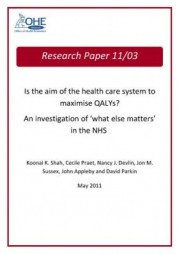Sign up to our newsletter Subscribe
Analysing Global Immunisation Expenditure

Sign up to our newsletter Subscribe


Just released is an OHE Research Paper that examines whether and how decisions about allocating resources for health care differ across the NHS and, particularly, in comparison to decisions by NICE. If important differences exist, the efficiency of resources allocation…

Just released is an OHE Research Paper that examines whether and how decisions about allocating resources for health care differ across the NHS and, particularly, in comparison to decisions by NICE. If important differences exist, the efficiency of resources allocation may be affected negatively.
Just released is an OHE Research Paper that examines whether and how decisions about allocating resources for health care differ across the NHS and, particularly, in comparison to decisions by NICE. If important differences exist, the efficiency of resources allocation may be affected negatively.
The appraisal of health care technologies by the UK’s National Institute for Health and Clinical Excellence (NICE) focuses on cost effectiveness, usually measured in terms of incremental cost per quality adjusted life year (QALY) gained. According to the authors of this new OHE Research Paper, however, cost effectiveness often does not appear to be the dominant consideration in decisions about resource allocation made elsewhere in the NHS.
In this paper, the authors examine what factors affect NHS policy decisions by analysing 51 Impact Assessments (IAs) completed by the UK Department of Health (DH) in 2008-9. Reported by the DH for all new legislation and policy implementation, IAs are intended to help ‘develop better policy by careful consideration of the impact of relevant options on all those affected.’ The official guidance for IAs suggests that QALYs, when used, should be valued in money terms, but does not specify a particular method.
The main source of data for this research is the DH Publications website, from which were downloaded IA documents published in 2008-9. Analysis showed that of the 51 IAs available at the time of research, only eight used QALYs to evaluate benefits, including four of those associated with the largest monetised benefits. Ninety-three unique benefits other than QALY gains were identified as having been used to justify NHS policy decisions. Most could be grouped into the following categories: improvement in health outcomes (cited in 26 of the 51 IAs), improvements in health service cost and efficiency (19 IAs), improvements in quality (15 IAs), and enhancing the patient and carer experience (11 IAs). For 21 IAs, no monetary impact was estimated as the IA stated that the benefits of the chosen policy could not be monetised or quantified.
Given the use in most IAs of several criteria, not all monetised, the authors suggest that multiple criteria decision analysis (MCDA) may be useful in ensuring consistent use of criteria. A recent OHE publication explains MCDA in greater detail.
Setting aside the issue of what cost and benefit perspective is ‘appropriate’, the authors point out that this research suggests that the perspectives adopted by NICE and the DH when assessing the impact of NHS spending are very different, and that this misalignment of aims has ‘clear implications’ for efficiency across the health care system. A greater consensus about what NHS goals are, and the relative importance of those goals, could improve welfare, they conclude.
Download Shah, K.K., Praet, C., Devlin, N.J., Sussex, J.M., Appleby, J. and Parkin, D. (2011) Is the aim of the health care system to maximise QALYs? An investigation of ‘what else matters’ in the NHS. OHE Research Paper. London: Office of Health Economics.
An error has occurred, please try again later.
This website uses cookies so that we can provide you with the best user experience possible. Cookie information is stored in your browser and performs functions such as recognising you when you return to our website and helping our team to understand which sections of the website you find most interesting and useful.
Strictly Necessary Cookie should be enabled at all times so that we can save your preferences for cookie settings.
If you disable this cookie, we will not be able to save your preferences. This means that every time you visit this website you will need to enable or disable cookies again.
This website uses Google Analytics to collect anonymous information such as the number of visitors to the site, and the most popular pages.
Keeping this cookie enabled helps us to improve our website.
Please enable Strictly Necessary Cookies first so that we can save your preferences!